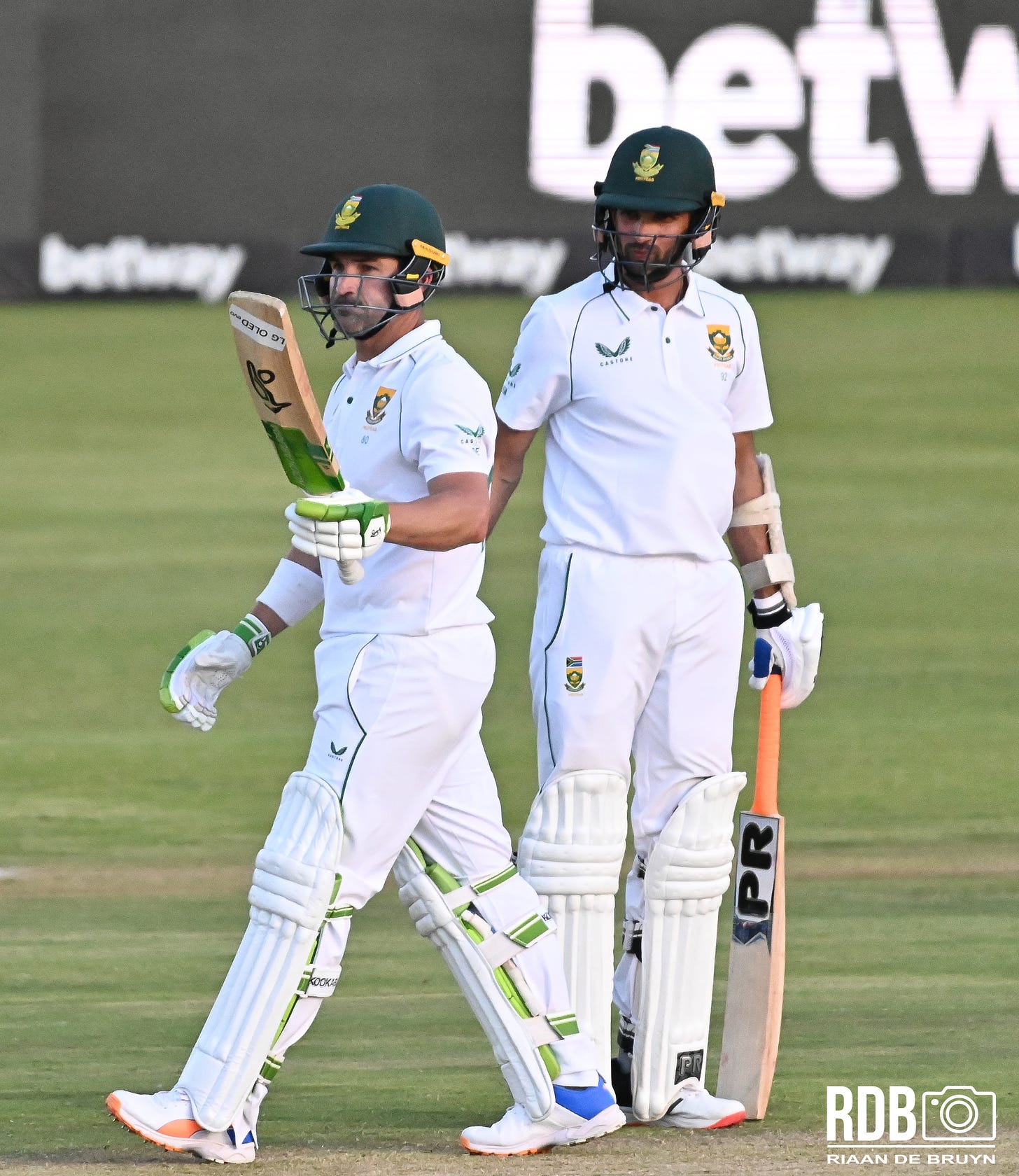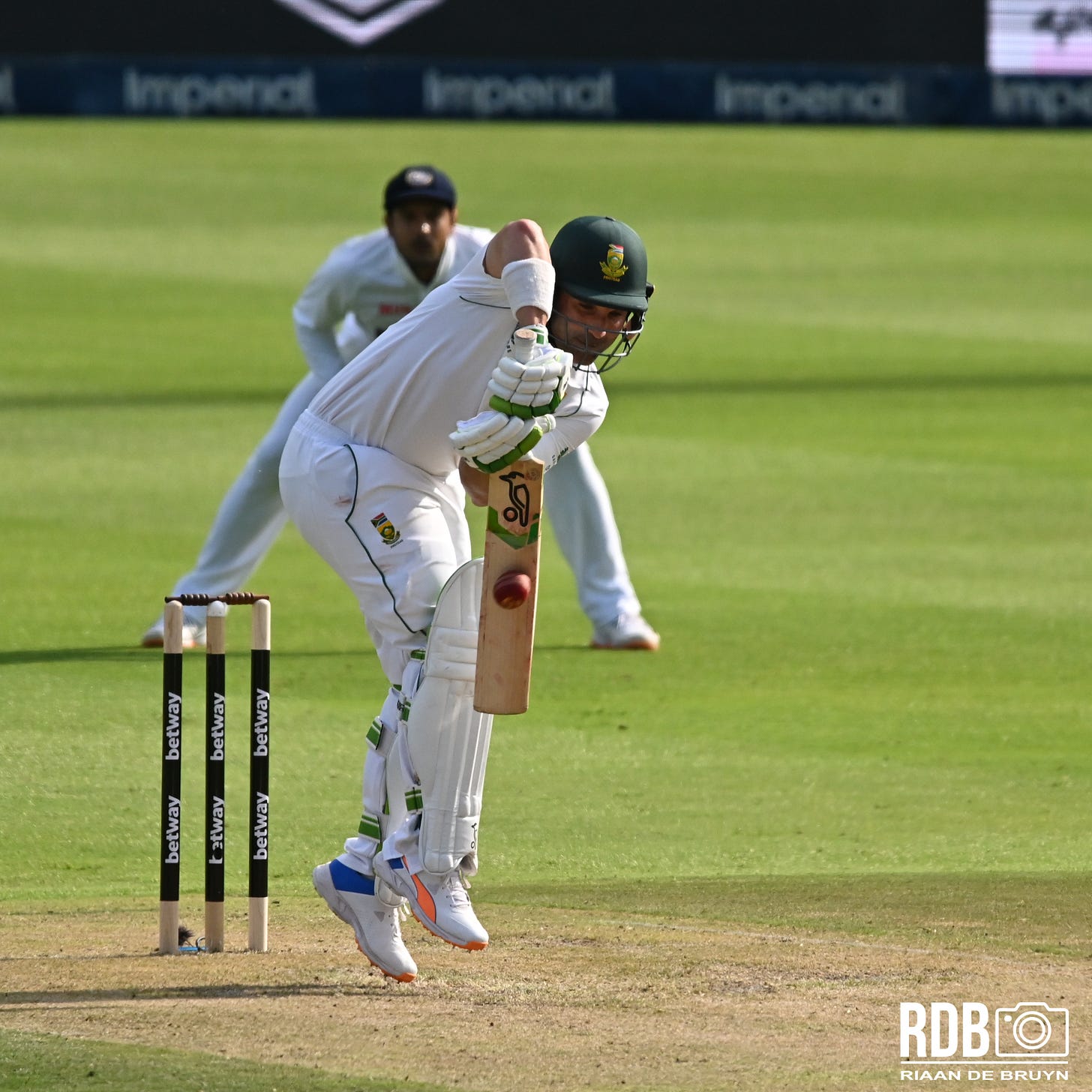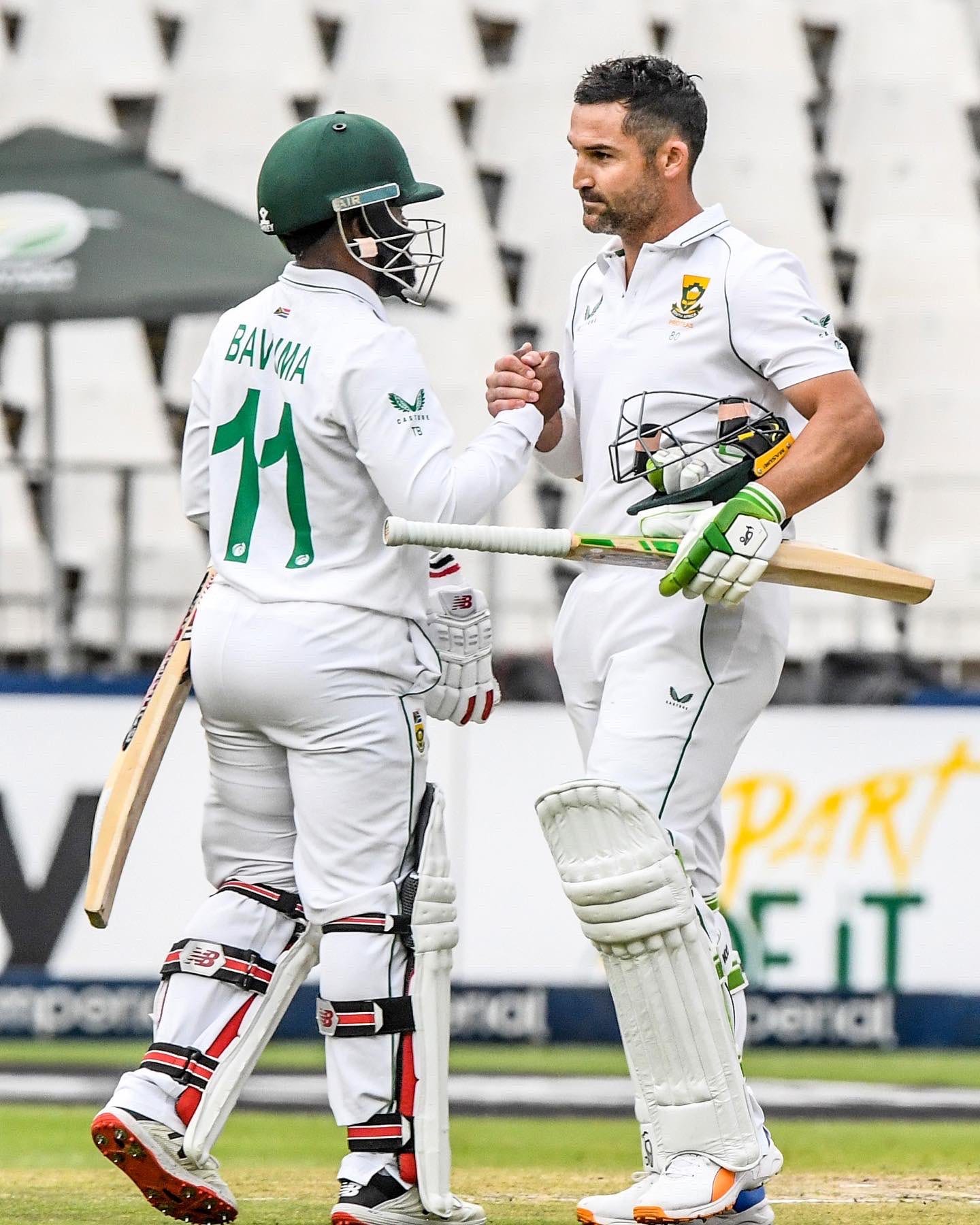“I have a hell of a lot to give, whether it's the Titans, whether it's the Proteas, I got a lot to give. Hopefully, I'll still have a few years left,” Dean Elgar told Derek Alberts when they sat down for the Inside The Game Podcast.
“I've played now for 15 years. Professional cricket. I've played for the Proteas for nine years. I think my career is only starting now. That's how I see it. It's only starting now. And you want to have those moments, you want to have those special moments where you go through everything, all the trials and tribulations and you still contribute massively as a player.” Dean Elgar
Dean Elgar would have made one hell of a squash player. His style might have looked as awkward as his batting style, but he would still have been as effective. Squash requires a great ability to absorb pressure from your opponent and the ability to also transfer it onto them in an instant. Dean Elgar is a master of that. That is what has made him one of the best openers around.
Of course, he chooses to dispute that assertion. That is classic Dean Elgar. He has a Dale Steyn-like outlook on cricket. He and Dale Steyn couldn’t be more different, but this is the one area where they are similar.
“I think his best trait is he doesn't take his achievements to heart,” says Dean Elgar. “It's a bit surreal. I think a lot of people would be like he's the best bowler South Africa's ever seen. In my opinion, I think he's the best bowler the world has seen, but he just wants to be Dale Steyn the tiger fisherman.”
When you ask Dean to talk about his greatest moments as a cricketer, he doesn’t lead with any of his 199 at Senwes Park or any of his other Test hundreds. Instead, he leads with his debut. He had to fly out as a replacement for JP Duminy, who had sustained an injury. In the end, he replaced his hero, Jacques Rudolph.
But that is not what sticks out to him. And is also not the fact that he made history by joining the list of cricketers with a pair of ducks on debut.
“I don't remember that whole week,” he says. “But I remember the outcome, which we beat Australia. I don't care about my, my shitstorm I honestly don't, I don't play for personal stuff.”
The other thing that sticks out about that tour is Ricky Ponting.
“That's something people also don't know, it was Ricky Ponting's last test. And to see the humility that he had in his last test,” says Dean.
After the match, while the Proteas were having their fines meeting, Ricky Ponting and a few other guys including Michael Clark, Nathan Lyon and others asked if they could join the Proteas dressing room. Ponting then gave a speech, thanking the South African side for the memories.
“I was like, ‘What? This is happening in my first game? It can't get better than this. It cannot get better than this,’” Elgar narrates. “Just the whole significance of that, like he cried. He cried in the final meeting.”
Elgar cannot think of anything that would top that.
There is nothing you can say to him that will make him agree that he is one of the best and he might make a Best XI list, any Best XI list. He argues that in his time he has played and watched so many great people play the game, people better than him that it would be ridiculous for him to think he could be better than any of them.
“I think it’s ominous, I won't accept that,” he says. “I think I've been quite average, actually.”
An average opener who has carried his bat four times so far in his career. That doesn’t happen a lot, least of all to average cricketers. Dean Elgar has carried his bat a record three times, that is many times as the legendary Desmond Haynes. He is in good company. That is one of a record to hold for an average cricketer.
“I want to do it again because I want to be the guy,” he says.
Carrying the bat is the one thing, the single personal accolade that he thinks is cool. It’s an accomplishment that he will take to heart. But it is not something that he seeks out or trains for. As he told Derek Alberts on the Inside The Game Podcast, he doesn’t prepare to bat for the whole day, he prepares to win.
“I don't play for the accolades or credit,” he says. “I'll rather sacrifice personal performance to winning, I would rather win a game, win a series than have personal accolades.”
The drive to win at all costs is his squash instinct. His battles with bowlers are a variation of squash matches, head-to-head contests that he is intent on winning at all costs. As on a squash court, Elgar’s purpose is to outplay and outlast his opponent. If anyone is going to be too tired to keep going, it’s definitely not going to be Dean Elgar.
Once he gets going, once he gets into gear, the Elgarhythm as Dale Steyn calls it, Dean Elgar is hard to dislodge. That’s how he has managed to carry his bat as many times as he has.
Dean Elgar was an ace squash player in his youth. Like any other kid, he tried his hand at a number of different sports, as long as they had a ball and some sort of running. He did everything and was okay in most of the things that he tried his hand at.
“But as I grew older I had to scale things down,” he says. “I'm not a big guy in stature. So rugby is out the door. I chose cricket and squash. Cricket was my summer sport and squash was the winter sport. But then squash started dominating my life, and at one stage I played it throughout the year.”
Had he found a way to earn a living through playing squash as a career, Dean Elgar would have taken that route. But in his youth, there appeared to be no way, so he traded his dream for a cricket helmet, pads and a bat.
“Cricket is great, but for me, squash was always my first love,” he says.
Squash’s loss was cricket’s gain. It was Free State schools cricket’s gain.
Grey College Bloemfontein holds a special place in South African cricket. The school has produced a number of South African greats and legends. The school has a target on them, every other cricketing school wants to defeat them. They are the gold standard.
Grey Bloem dominates the Free State schools cricket scene. It’s a bit of a big deal to make the Free State side when you are not a Grey Bloem student. Dean Elgar, who went to St. Dominics College in Welkom, didn’t just make the Free State side, he captained it. From there he went on to captain the SA Schools side.
“A Free State boy captaining SA Schools, it's not something people speak about every day. I am very proud of that kind of moment as a youngster,” says Deano. “It has been something that I'm very proud of.”
To really understand why this mattered to him, and still does today, consider this; Dean Elgar was an outsider. He has always had a playing style that many people view as different. Many say his technique is odd. When you are a youngster it is very difficult to shine when you don’t look like a textbook player. Dean also did not attend the gold standard school. Add to that the fact that he was an English boy in Free State.
Free State is dominated by Afrikaaners, and it is very difficult for an English boy with all that baggage to shine. You would have to be very good at what you do. It takes a lot of grit because a lot of times you are asked to prove yourself again and again and again. And that’s what he did.
Those experiences have helped shape him as a leader. He doesn’t shy away from hard talks and putting a rocket under you if need be, but he is also very empathetic. Ask him about the sandpapergate issue of 2018. He is articulate. He is the first one to agree that what was done by Steve Smith and his men was wrong, but he also understands why they did it. And he accepts the role they played as opponents.
“I think the emotion got the better of everyone. I think we weren't playing cricket,” Dean says. “They were playing the people. I think we disrespected the Australians irrespective of whatever going through, they also disrespected us. So I think in general cricket took a knock.”
He is big on responsibility and won’t deflect.
He also feels that many people overreacted in the way they treated Steve Smith, David Warner and Cameron Bancroft. The guys had done something wrong on a cricket field and they were treated like criminals, escorted by police to the airport and all that. A lot of unnecessary stuff.
You can feel the emotion in his voice when he speaks of what was lost during the whole affair. It is the same emotion he shows when he speaks of captaining the Proteas.
“The cricket is such an external for me, but the person that you become through what you're doing is very important. The ability to connect with different people different cultures, different races, for me, that's a massive thing,” he told Inside The Game. “I think cricket will look after itself. But you have to look after the life of the cricketer.”
He adds, “You can be very selfish in this environment or you can be a giver. I talk about being a giver or a taker. Are you taking oxygen or are you giving oxygen? I'd like to think I give.”
Elgar is the first one to admit that he was a taker in his early years. I remember hearing a story about him behaving selfishly in his early years as a Proteas player. It was probably on his debut tour. Elgar was one of the first guys on the plane and he chose a seat close to the door. Those seats have the best legroom.
They are seats that you normally leave for the tall guys, like Morne Morkel. And Morne was one of the last guys to board the plane. Instead of making way for him, Dean kept his head down and pretended not to notice. Dean is a short guy, it wouldn’t have mattered a lot if he had voluntarily given up the seat.
He wouldn’t have been too uncomfortable. Morne had to be cramped with little leg space. It was an uncomfortable flight for him. That is not the sort of behaviour you would expect from a team man or a future leader. It is the kind of behaviour you can expect from an immature young man.
“I like to think I look at when I was younger,” says Dean, “sure you make mistakes because that's your growing phase.”
Elgar points out that it is easy to take a lot and not give anything when you are still learning. But, at some point, you have to grow out of that give to others in the same way that others gave to you.
“Now I want to give. I want to give so much to young guys,” he says. “You have to give back to the environment that's given you so much.”
He wants to give what he has learned with the hope that it will make others not just better cricketers, but better human beings. That is what his leadership is all about.
Dropping squash and focusing on cricket turned out to be the beginning of a long and successful career. For a while he didn’t take it too seriously, even when he captained SA Schools, he only considered it to be a phase that would pass. The following year Elgar captained the SA Under-19 side to the world. 16 years later he finds himself as the Proteas captain.
Dean has no illusions about captaining the Proteas. Captaining SA Schools and SA Under-19 was child play, literally. He accepts that it is a hard job, because of the power and influence that is in the position. It is a job that is hard to do well and easy to do badly. It is for this reason that he has so much respect for Graeme Smith, who literally did this for the entirety of his international career.
“Why accept it if you are not willing to go the extra mile?” He asks.
It is a job that requires hardness, and he has that in spades.
“It's something that as a kid, you dream of that stuff,” he says.
This is something that he spoke of with his father and with his coach as a youngster.
“But you don't understand what it entails, you don't understand what comes with it. I think in South Africa, you deal with so many other externals that you never think of as a kid. It's getting to know your teammates, different backgrounds, politics, dynamics, building a team culture, trying to get someone on the same everyone on the same page.”
And all of that is before you get to the cricket part of things. It’s a complex and difficult job. But, part of the Elgarhythm is not to back down in the face of a challenge. Dean enjoys challenges, and he is enjoying the role, so far.
And even though his early years did not prepare him for this role, he is grateful to have done it then because that is what set up the platform for him to have a career.
“It was the start the start of a career that I never thought I would have,” he says on Inside Edge. “I thought it might be a phase. And you never know these kinds of things come and go.”
It is possible that Dean Elgar didn’t think a lot about his career as a cricketer because he underestimated his abilities. The other thing is that he takes things as they come, he doesn’t like to get ahead of himself. He plays and lives in the moment. And that’s what he did when he was the SA Schools captain.
That is also what he did when he was with Eagles and Knights for the first eight years of his career. Nothing else mattered to him at the time. Heino Kuhn and Farhaan Behardien did all they could to lure him to Titans. It was a much bigger opportunity that would help his career grow, but he wasn’t thinking about all that.
“The problem is if you look too far you lose your vision of where actually want to go,” says Elgar. “I was just keen to play, it didn't matter where.”
Dean feels that that is the problem with some of today’s cricketers, they forget the present and get tied up in a future that hasn’t arrived yet so much that they forget the present. His opinion is that you have to climb the mountain that is before you think of the next one.
While he was with Eagles and Knights, Elgar wasn’t in a rush. He let things work themselves out as he honed his skill. Not being in a rush allowed him to learn his trade at a steady pace. He still is not in a rush, as he learns how to handle his new responsibilities.
Refusing to be rushed is part of the Elgarhythm and the reason why he is so good at what he does.
Thank you to everyone who has shown their appreciation of my work and this newsletter. I am entirely freelance and have no intention of putting content behind a paywall. However, for me to be able to continue producing more content, I depend on your patronage. So, please do support my work on Patreon.
Alternatively, you could Buy Me A Coffee.
Also, please encourage anyone whom you think may be interested in my work to subscribe.







